Probiotic supplements provide a boost to the naturally-occurring beneficial bacteria that live inside your body’s digestive tract.
Taking a probiotic supplement every day is a fantastic way to improve your digestion, boost your gut health, improve your immune system, and reduce inflammation.
Want to find the best probiotics on the market? Our research team put together these rankings to find the cleanest and most effective probiotic supplements:
Our advisory panel and our research team rank the best health products and supplements based on performance, label accuracy, and the efficacy of the ingredients in the products.
- Best overall: 1MD Complete Probiotics
- Best probiotics with lactobacillus bacteria: Probiotic 40 Gut Boost +
- NOW Probiotic-10
- Best probiotic and prebiotic combination: Garden of Life Primal Defense Ultra
- Nutrition Essentials Probiotic
Research
Rankings
Last updated: March 25, 2023
Probiotics considered: 30
Hours of research: 54
Experts reviewed: 14
Scientific papers referenced: 41
| IMAGE | PRODUCT | |
|---|---|---|
Best Overall 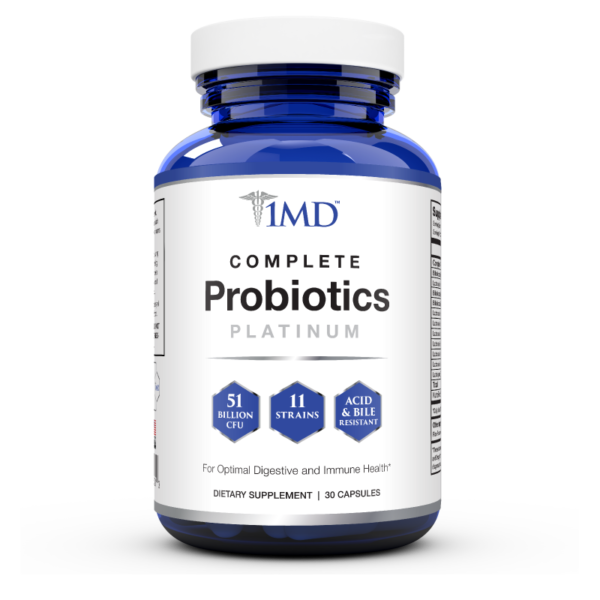 | 1. 1MD Complete Probiotics
| View Latest Price → |
Best probiotics with lactobacillus bacteria 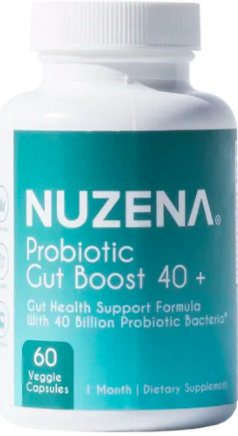 | 2. Probiotic 40 Gut Boost +
| View Latest Price → |
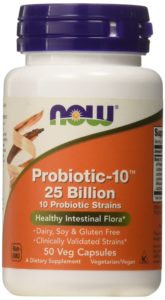 | 3. NOW Probiotic-10
| View on Amazon → |
Best probiotic and prebiotic combination 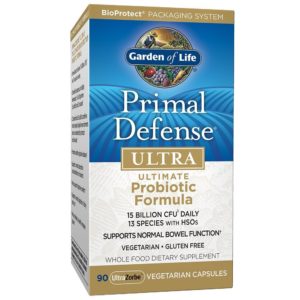 | 4. Garden of Life Primal Defense Ultra
| View on Amazon → |
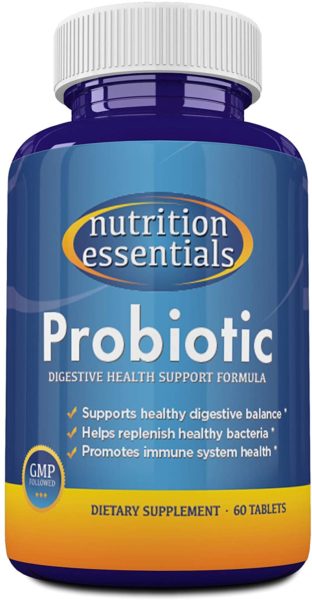 | 5. Nutrition Essentials Probiotic
| View on Amazon → |
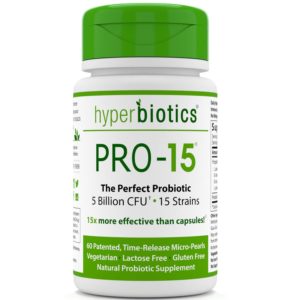 | 6. Hyperbiotics PRO-15
| View on Amazon → |
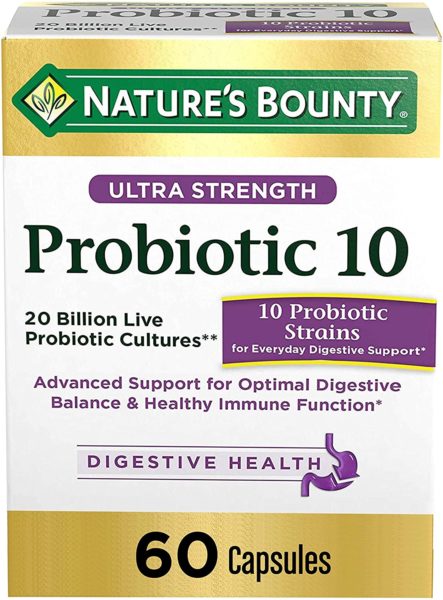 | 7. Nature’s Bounty Ultra Probiotic 10
| View on Amazon → |
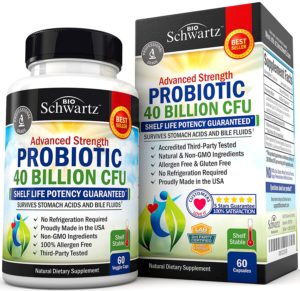 | 8. Bio Schwartz Advanced Strength Probiotic
| View on Amazon → |
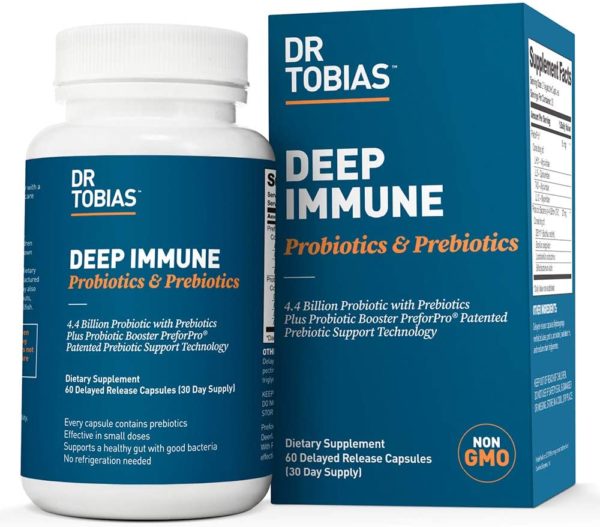 | 9. Dr. Tobias Deep Immune Probiotics
| View on Amazon → |
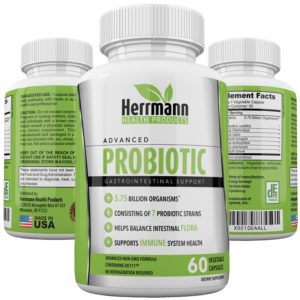 | 10. Herrmann Health Products Advanced Probiotic
| View on Amazon → |
1. 1MD Complete Probiotics
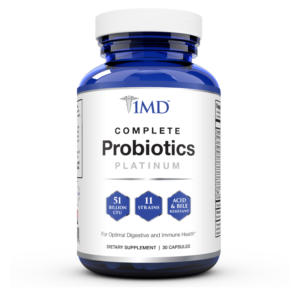
Click here for the lowest price
For those who’re serious about taking the most potent probiotic, 1MD Complete Probiotics is the best product you can get.
No other probiotic supplement can compete with the 51 billion cultures and 11 unique strains with each serving.
Dr. David Kahana, a renowned gastrointestinal doctor, says, “When my patients ask me what probiotic is best, I recommend 1MD’s Complete Probiotics Platinum. Complete Probiotics Platinum has 11 different strains and guarantees 50 billion live cultures per capsule. It also contains an effective dosage of Nutraflora prebiotic fiber that will ensure these cultures get the fuel they need to really make a difference in your gut.”
Why is this important?
Because several probiotic products only have 2-3 different strains, and consuming probiotics with a diverse collective of good bacteria strains offers a better bacterial balance for your gut.
From overall immune health to providing your body with better digestion and gut health, 1MD Complete Probiotics is one of the better daily habits you can have in the supplement space.
All natural, no artificial sweeteners, no artificial coloring, no artificial preservatives and 100% GMO-free.
This is important. When you’re taking a probiotic as a daily supplement, the last thing you want is “added stuff” to mess with your fatigue, oxidation, blood pressure and microbiome balance.
Made in the USA and in an FDA-approved facility.
BodyNutrition‘s all-around probiotic supplement winner of 2023.
Click here for the lowest price
2. Probiotic 40 Gut Boost +

Click here for the lowest price
Nuzena is a brand-new supplement company known for their potent formulas.
Probiotic 40 Gut Boost + by Nuzena is shamelessly stacked and also one of the cheaper options on the list.
They are also one of the most robust probiotic formulas that we’ve reviewed. The formula contains 40 Billion probiotic bacteria made up of 4 individual strands for increased bioavailability.
When it comes to gut health we know that having multiple strains of probiotic bacteria your supplements is essential — as finding the correct match to your mitochondria can vary between different strands.
While some of the other probiotic supplements we’ve reviewed here have similar strands, Nuzena really stands out with the quality of their formula.
3. NOW Probiotic-10
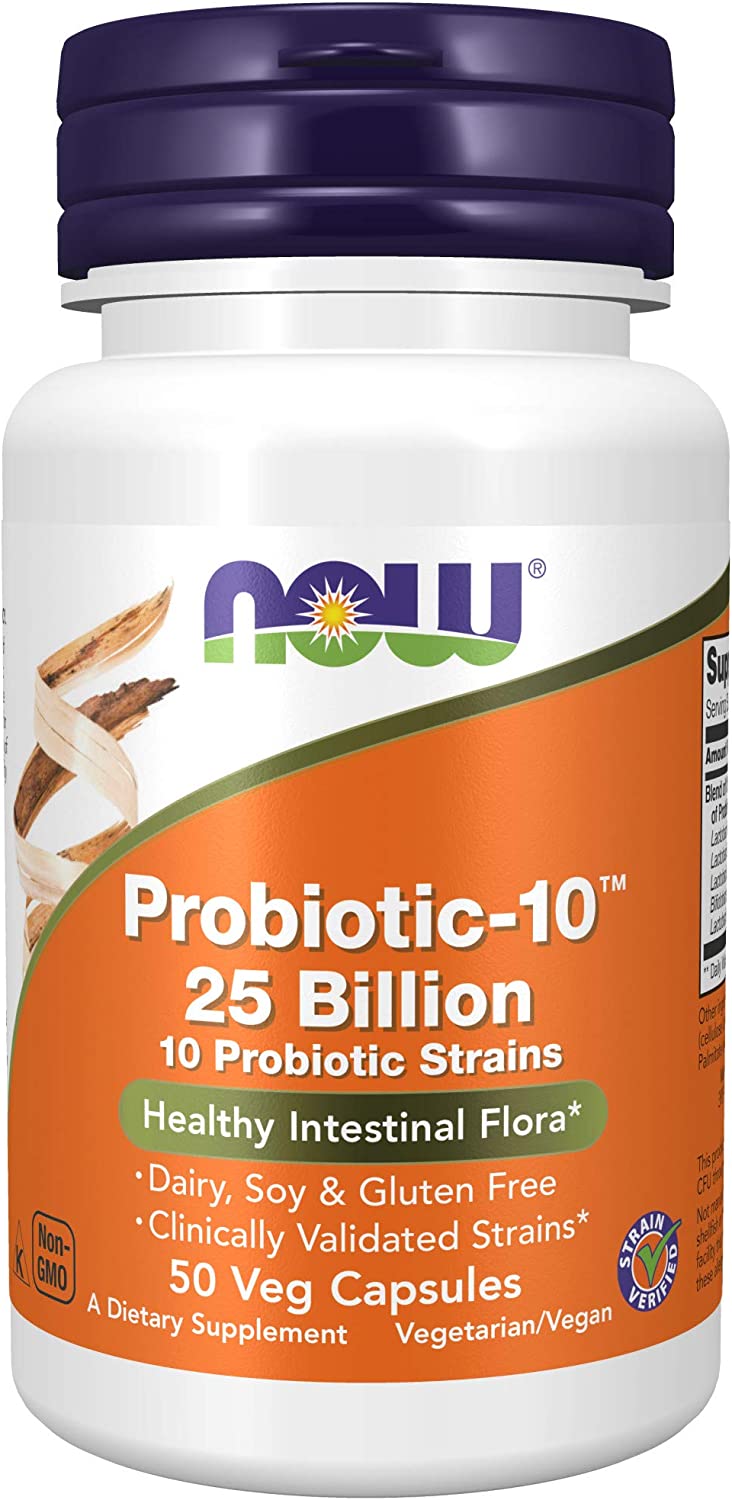
Although this falls short of our winner, NOW Probiotic-10 contains ten different probiotic bacteria strains, which total to an eye-popping 25 billion colony forming units.
The bacteria are delivered via a vegetarian capsule, and NOW Probiotic-10 uses standardized bacteria strains, which guarantees that you are getting the same specific strains that are used in scientific studies on the benefits of probiotics.
With a simple cellulose capsule, some of the bacteria might be lost to stomach acid, but the huge overall bacteria count should more than make up for this.
4. Garden of Life Primal Defense Ultra
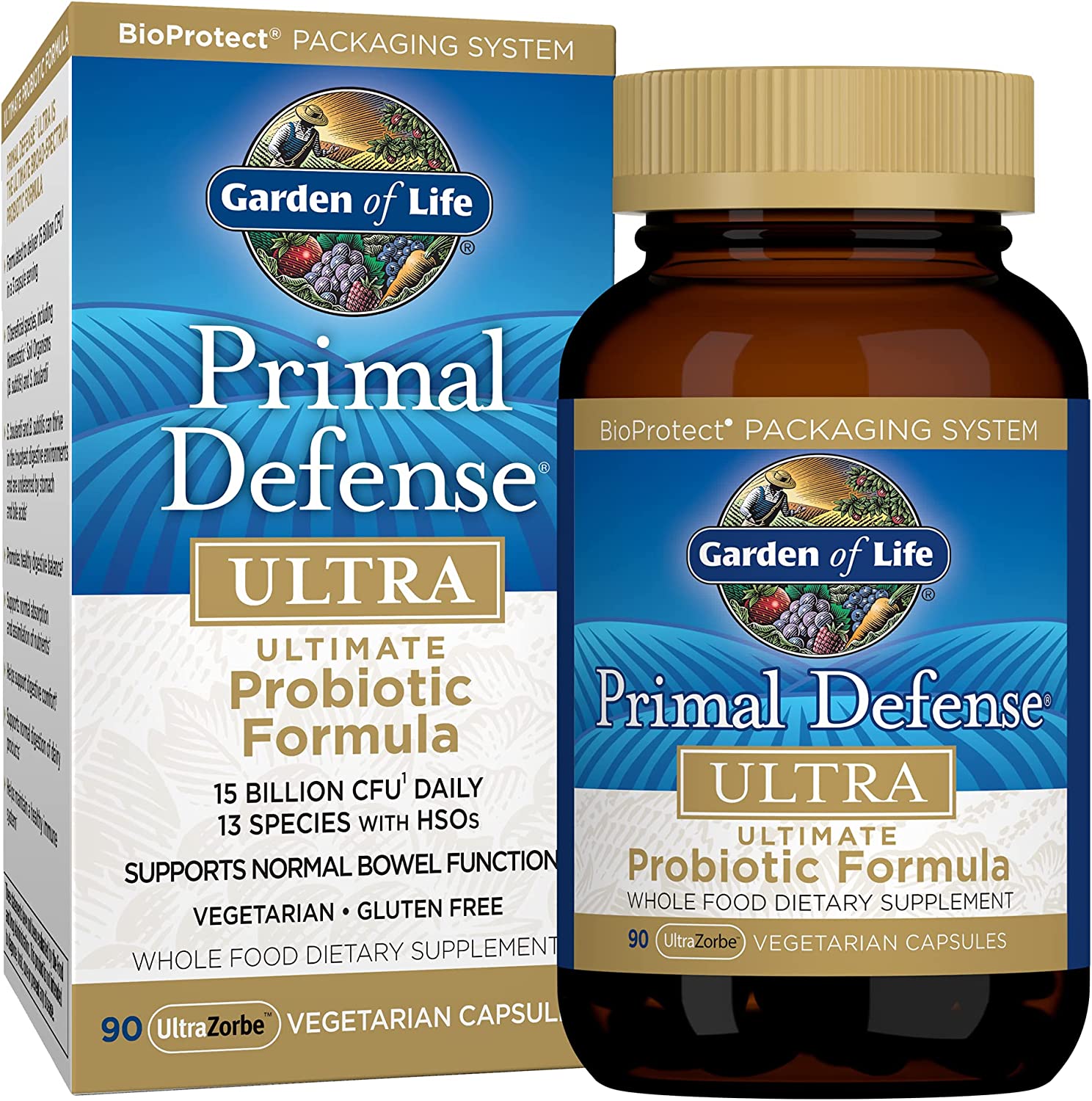
Garden of Life always has an interesting take on supplements, and their Primal Defense Ultra probiotic is no exception. The thirteen strains of probiotic bacteria are supported by a matrix of organic oat grass processed with an enzymatic procedure to help bacteria growth, as well as a small amount of iron, which is known to massively boost bacteria growth inside the body.
They also include “ionic plant based minerals,” presumably to boost growth further. Garden of Life generally has a love it or hate it approach; if you want all the extras, it’s a great choice, but if you just want plain old bacteria in a pill, there are better options.
5. Hyperbiotics PRO-15

Hyperbiotics uses a formulation that packs fifteen different bacteria strains into their proprietary blend with a total of five billion CFUs.
Hyperbiotics also employs a proprietary “pearl capsule” technology which is intended to allow more of the bacteria to make it to your intestines to populate the gut flora. With Hyperbiotics’ allergen-free guarantee, this product is a big winner.
6. Nature’s Bounty Ultra Probiotic 10

The ubiquitous and trusted Nature’s Bounty brand delivers when it comes to probiotics. Their Probiotic 10 supplement contains 20 billion colony forming units and, as the name suggests, ten different strains of bacteria.
The capsules are vegetarian, and there aren’t any extraneous ingredients included either, so this one’s a very solid choice.
7. Nutrition Essentials Probiotic
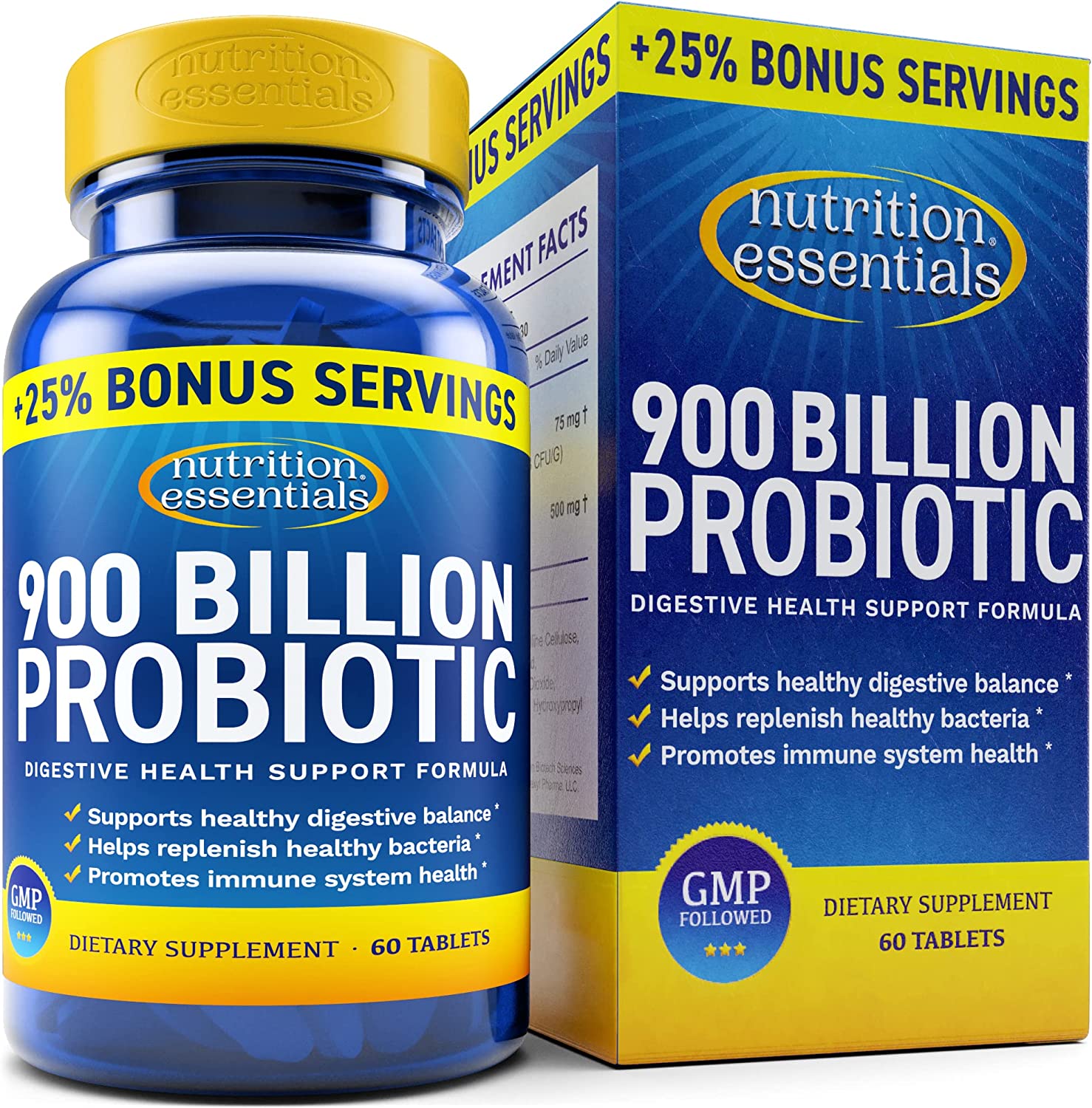
If you want a “bacteria bomb,” look no further: Nutrition Essentials crams some 15 billion colony forming units into their tablets, along with half a gram of “pre-biotic” materials that foster the growth and reproduction of the bacteria. Nutrition essentials is different from some of its competitors in that it is comprised of just one probiotic bacteria, bacillus coagulans.
Fortunately, this is one of the better-researched probiotics, with research to date finding that it is a safe and effective treatment for irritable bowel syndrome and related gastrointestinal problems (1).
The tablet is a pretty simple one, made of calcium carbonate, cellulose, and stearic acid, so it may face some problems getting the bulk of the probiotic bacteria into your intestines, but the high number of bacteria colony forming units to begin with should help offset that problem.
8. Bio Schwartz Advanced Strength Probiotic

Though Bio Schwartz includes a huge amount of bacteria (40 billion colony forming units!) the choices of which ones to include are a little odd.
The staple bacteria lactobacillus acidophilus is there, but the other three are less common and less well-researched bacteria.
The supplement also includes fructooligosaccharides to support the growth of the bacteria, but it doesn’t document how much it actually includes in the supplement.
9. Dr. Tobias Deep Immune Probiotics

The probiotic blend offered by Dr. Tobias includes five different types of bacteria which total to a bit under five billion colony-forming units.
The capsules are another major selling point; Dr. Tobias claims that their capsules resist the digestion of the stomach acid, making it so that more bacteria make their way into the intestinal tract instead of being destroyed by stomach acid.
10. Herrmann Health Products Advanced Probiotic

With a combination of seven different probiotic bacteria, including Lactobacillus, Bifidobacterium, and Bacillus strains, Hermann Health Products offers a solid combo of healthy bacteria, though only at a dose of 5.75 billion CFUs.
The lower dosage and lack of cutting edge bacterial strains means it finds itself lower in the rankings than many of its competitors.
Category winners
Best probiotics overall: 1MD Complete Probiotics
1MD takes our top spot thanks to its unbeatable probiotic count–at 50 billion CFUs and 11 unique bacterial strains, it stands head and shoulders above the competition when it comes to variety and potency. Add to that some fructo-oligosaccharides for prebiotic support and you’ve got a clear winner.
Best probiotics with lactobacillus bacteria: Nuzena Probiotic 40 Gut Boost +
Lactobacillus bacteria are a category of probiotic bacteria that break down carbohydrates and are particularly popular to take for digestive health. When it comes to probiotics that provide lactobacillus, Nuzena Probiotic 40 Gut Boost + is our favorite thanks to its potent combo of three different strains of lactobacillus bacteria.
Best probiotics for women: 1MD Complete Probiotics
1MD is our top pick for women thanks to its diverse range of probiotic strains. Women have higher rates of digestive health problems like IBS and constipation than men, so ensuring a broad range of healthy gut bacteria is particularly important for women. Since 1MD tops the charts when it comes to variety, it’s our top pick for women.
Best probiotics for weight loss: Nuzena Probiotic 40 Gut Boost +
When it comes to weight loss, Nuzena is our pick thanks to its focus on delivering a high CFU count of the most well-studied bacteria that contribute to gut health. Its use of specific, well-studied lactobacillus and bifidobacterium strains makes it our favorite for people looking to lose weight.
Best probiotic and prebiotic combination: Garden of Life Primal Defense Ultra
Garden of Life uses a combination of enzymatically-processed oat grass and barley grass to provide a matrix of fiber and nutrients that support healthy gut bacterial growth. If you want a solid dose of healthy bacteria plus an all-natural source of prebiotic nutrients, Garden of Life is the way to go.
Best probiotics for digestive health: 1MD Complete Probiotics
Whether you have digestive problems like irritable bowel syndrome or are just looking to improve your digestive wellness, 1MD is a great choice. It has a high dose of several different healthy gut bacteria strains, and includes prebiotic nutrients as well to ensure these bacteria continue to grow and multiply.
Who should buy probiotics?
Probiotics are a great supplement for anyone who cares about their gut health, but they’re especially worth considering if you fit into one or more of the following categories:
People who have a disrupted gut microbiome after taking antibiotics. While antibiotic drugs can be very effective against infectious bacteria, they also lay waste to the healthy bacteria present in your stomach and intestines, paradoxically leaving you vulnerable to health disruptions in the future.
Taking a probiotic supplement after a course of antibiotics can help rectify this imbalance.
People with chronic gastrointestinal conditions. Probiotics are also very helpful in many people who have intestinal problems like Crohn’s disease, ulcerative colitis, or irritable bowel syndrome (IBS).
The mechanisms behind many of these intestinal problems are unknown, but appear to be linked both to your immune system function and your levels of probiotic bacteria.
Not only are gut bacteria populations different between people with intestinal problems and health people, but modifying the gut bacteria in people with irritable bowel syndrome or Crohn’s disease can lead to improvements in symptoms, which strongly suggests gut bacteria is linked to the problem.
People with an unhealthy diet. Beyond people with chronic gastrointestinal tract conditions, there is increasing recognition that even healthy people can have a disrupted gut biome as a result of their diet.
Western diets, with their relatively low fiber content and high levels of sugar and refined carbohydrates, do not promote the kind of robust and diverse gut biome that you’d get on a diet high in fiber, fresh fruits, and vegetables.
Even healthy adults are increasingly turning to probiotics to better their odds against these same chronic diseases, thanks to the circumstantial evidence that is continually piling up that indicates that gut bacteria composition is one of the cornerstones to overall health and wellness.
People trying to lose weight. Your gut bacteria play a significant role in weight regulation, so much so that obese people have significantly different gut bacteria populations than people who have a healthy weight. Probiotics are a great addition to any weight loss program since they’re compatible with just about any diet.
How we ranked
Probiotics are exploding in popularity, which means there are dozens of options on the market. We winnowed these down to the ten best using the following criteria:
Potent dosage, measured in CFUs. Unlike other supplements, probiotics don’t measure doses in milligrams or IUs: they use a special unit called colony forming units, or CFUs for short.
These colony forming units are defined by their ability to start a bacterial colony, or growth of bacteria. The more CFUs, the more live bacteria are contained in the supplement.
Clinical research indicates that you want at least one to five billion CFUs per day minimum to get the desired effects, so we dumped anything that had less than one billion CFUs, or that did not explicitly state its live bacterial colony content.
The more good bacteria the better. Beyond the minimum threshold of one billion CFUs, we prioritized supplements that had higher doses. That’s why 1MD and Now Probiotic-10 rose to the top: their ultra-high doses of 50 and 25 CFUs made them top contenders, and on par with some of the most powerful probiotic supplements that have been tested in clinical research.
Targeted and evidence-based probiotic strains. We sought out brands that used specific strains of beneficial bacteria as opposed to general categories or species.
For example, despite its popularity, NewRythm Probiotics did not make our list for this reason: it merely lists the species of bacteria, such as lactobacillus acidophilus.
Compare that to Nature’s Bounty Probiotic 10, which lists the exact strain of bacteria used, such as Lactobacillus plantarum 299v. This level of specificity allowed us to compare the ingredients to what has been tested and proven beneficial in the scientific literature.
Broad ranges of effective bacterial strains. Finally, we prioritized probiotic supplements that provided a variety of probiotic strains known to be beneficial.
Brands that focused only on one type of probiotic, such as Klaire Labs Ther-Biotic Factor 4, didn’t make the cut since we were looking for a diverse range of proven probiotic bacteria, not just one type.
Some of the specific type of probiotic bacteria we looked for include lactobacillus, bifidobacterium, and streptococcus thermophilus—all of these probiotics have been specifically investigated for their health benefits in scientific research.
When possible, we matched up specific bacterial strains in commercial probiotics with the strains used in research to ensure the top-ranked probiotic supplements were the most effective ones on the market.
FAQ
Q: What are probiotics?
A: Probiotics aren’t just any type of bacteria—they are good bacteria that live in your intestine and which have been associated with positive health benefits.
Often, these bacteria are found in fermented foods, like the lactobacillus and bifidobacterium found in cheese and yogurt. To get probiotic bacteria in higher doses, a probiotic supplement is the way to go.
Q: What is the difference between prebiotics and probiotics?
A: Probiotics, as described earlier, are living bacterial cells that reproduce inside your body and definitively change the makeup of your gut bacteria.
There are many different kinds of probiotic bacteria, but they all share the fact that they are, fundamentally, living creatures that multiply inside your body.
Conversely, prebiotics are like functional foods for bacteria: prebiotics are nutrients that facilitate the growth of beneficial bacteria inside your digestive tract.
Even something as simple as psyllium husk or other kinds of fiber supplements can be a prebiotic, because probiotic bacteria can consume this fiber for energy. Likewise, you’ll also see prebiotics that contain inulin, a plant-derived fiber that’s incredibly useful as energy for probiotic bacteria, as well as fructooligosaccharides, which are carbohydrates similarly useful for probiotic bacteria.
Prebiotics are often used as a “booster” to either augment your natural levels of probiotic bacteria, or in combination with a probiotic supplement to accelerate the growth of the probiotics that you are taking.
Q: How should you take probiotics and antibiotics at the same time?
A: Though it sounds counterintuitive, the scientific literature suggests that taking probiotics at the same time as antibiotics is the best way to prevent some of the the negative side effects of an antibiotic.
Of course, as with any prescription medication, you should talk to your doctor to make sure there aren’t any special reasons not to mix prebiotics and probiotics, but large meta-analysis studies of clinical research has found that probiotic supplements are extremely effective at preventing side effects like diarrhea, but might not be as helpful if you wait until side effects have already developed (2).
In other words, they are a better prevention than treatment. In clinical research, probiotics and antibiotics are usually taken at the same time: the probiotic bacteria seem resilient enough not to get totally destroyed by the antibiotics.
Keep in mind that not all antibiotics work on all bacteria, so a broad-spectrum probiotic supplement may have a better chance of surviving during the course of an antibiotic treatment.
While common sense might indicate that it would be wasteful to take probiotics and antibiotics at the same time, the scientific research actually suggests precisely the opposite: it’s better to start taking probiotics right away instead of waiting to finish your course of antibiotics.
Related articles
Recap
Probiotics are supplements that contain beneficial bacteria that improve the health of your digestive system and boost your immune function.
They provide assistance to your body for cultivating friendly gut bacteria, which can be helpful in improving a range of health conditions, including immune system function, weight management, depression and systemic inflammation.
Shoot for a dosage of at least five billion CFUs per day, and higher if you are specifically taking probiotics for a digestive tract issue.
If you are taking probiotics to help prevent side effects from a course of antibiotics, don’t delay taking a probiotic supplement until you are done with your antibiotic prescription—the scientific research shows that taking them at the same time is actually far more effective than waiting until digestive side effects from antibiotics appear.
While there is still plenty more research coming out on probiotics, the results so far are extremely promising.
For BodyNutrition‘s #1 probiotic supplement recommendation, click here.